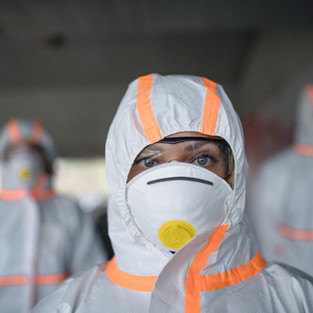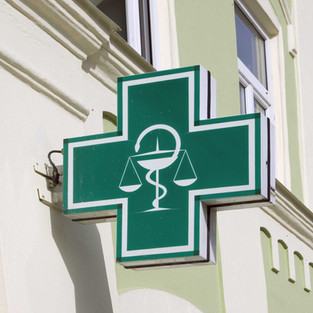WHAT HELP CAN AYURVEDA/HERBAL MEDICINE OFFER FOR ANTI-COVID MOTIVE ?
- Alan Verdi
- Aug 27, 2024
- 5 min read
POTENTIAL HERBAL SUPPORT-
Cimicifuga rhizoma,
Meliaecortex
Coptidis rhizoma
Phellodendron cortex
Sephorasubstrata radix reduced the MHV
Shuanghuanglian, discovered in China's medical Institute, which is a blend of Forsythia, Chinese skull cap and Honeysuckle is categorized as antiviral, antibacterial and found to be good for the immune system. It is also used for treating common symptoms such as fever, cough and sore throat.
"It is not effective to follow the old path in treatment," said Fang, "because the novel coronavirus mainly targeted the respiratory and digest systems of the human body. I recommend two herbs which I find quite effective in treating the patient: Huzhang (Asian knotweed, or tiger stick) and Mabiancao (vervain). They are good for the intestinal and respiratory tract."
Dr. Fang recommended herbs for clearing heat and detoxification, saying that the weather in Wuhan was similar to Canada when the pandemic broke out in January. He suggested medicines with the function of adjusting the qi , ventilating the lungs and relieving sore-throat for patients with mild symptoms, while for seriously ill patients, he recommended ginseng.
One potentially effective approach to patient care is a synthetic form of quinine, called hydroxychloroquine. Quinine is a compound extracted from the bark of the Cinchona tree, which is native to Peru. Originally used for the treatment of malaria until resistant strains emerged, hydroxychloroquine is less toxic than the original amine synthesized in 1934 (chloroquine). However, chloroquine is more effective against certain strains of malaria. Currently, malaria is treated with natural and synthetic forms of the Chinese herbal medicine Qing Hao (artemisia).
This ideology of Herbal Medicine use gives an Ayurvedic perspective originated from ancient India, It reflects a much more sensible view point of how some south-east asian herbs have highly potent medicinal properties and many of them include daily use herbs like Gensing , Black Cohosh and many more common south-east asian herbs found vastly in countries like India, Bangladesh, China and Nepal. Well it is not only extracted herbs that have some preventive effects over immunity enhancement against diseases and infection, Ayurvedic raw herbal techniques like Rasayana therapy is an Ayurvedic rejuvenation therapeutic technique which helps in maintenance & promotion of immunity. Central Council for Research in Ayurvedic Sciences states Rasayana commonly uses herbs like Amalaki (Phyllanthus emblica), Aswagandha (withania somnifera), Brahmi (Bacopa monnieri), Shankhapushpi (Convolvulus pluricaulis), Guduchi (Tinospora cordifolia) and Yastimadhu (Glycyrrhiza glabra) etc., which promote physical and mental strength. Some breathing exercise like pranayama and Kapalbhati kriya not only helps with oxygen content of blood in human body but also promotes a better lung health which contributes to having comparatively higher immunity system.
Researchers from University of Palermo (Italy) and Hebrew University Faculty of Medicine (Israel) published findings on the treatment of COVID-19. [1] They note, "Chloroquine seems to be effective in limiting the replication of SARS-CoV-2 (virus causing COVID-19) in vitro." [2] They cited State Council of China research, noting that chloroquine is "highly effective in reducing viral replication" in cells infected by SARS-CoV-2. In addition, Gao et al. demonstrate that chloroquine is more effective than a control group in 100 patients for reducing exacerbations of pneumonia, duration of symptoms, and delay of viral clearance. [3] The research of Gao et al. indicates that chloroquine may reduce the length of hospital stays and provide effective treatment for COVID-19 related pneumonia.
Based on the evidence, chloroquine phosphate tablets (500 mg, 2 times per day) for a total of 10 days is the official recommendation of the Department of Science and Technology of Guangdong Province and Health Commission of Guangdong Province for patients with SARS-CoV-2 related pneumonia, as long as patients have no contraindications to the medication. The panel also recommended avoiding the following drugs: chinolones, macrolides, ondansetron, and many antiarrhythmics, antidepressants, and antipsychotics.
The Dutch Center of Disease control (CDC) recommends chloroquine and oxygen therapy, although dosage recommendations vary from the Chinese protocol. The Italian Society of Infectious and Tropical Disease also recommends chloroquine with a slightly different dosage protocol as well. The University of Palermo (Italy) and Hebrew University Faculty of Medicine research paper concludes that there is sufficient pre-clinical evidence for the use of chloroquine for COVID-19 treatment. [4] Given the paucity of research on COVID-19, more investigations are recommended.
COVID-19 is identified with an initial outbreak in Wuhan (China) in December 2019. On January 29th of 2019, the National TCM Rescue Team (China) intervened at the Wuhan Jinyintan Hospital. After five days, eight patients afflicted with COVID-19 were discharged after treatment with Chinese medicine. Of these eight individuals, six had been critically ill prior to administration of traditional Chinese medicine. [5] Chinese medicine had been used in similar conditions in 2003 during the SARS outbreak, with documented clinical successes. [6] Despite initial clinical successes and promising research, the cure rate for COVID-19 remains difficult to achieve and, even with integrative medicine available, remains an extremely dangerous contagion.
According to the National Administration of Traditional Chinese Medicine (NATCM), the herbal formula Qing Fei Pai Du Tang had a 90% response rate out of a total of 214 clinical cases of COVID-19 related pneumonia. [7] Patients were treated in Shanxi, Hebei, Shanxi, and Heilongjiang Provinces in this clinical investigation. A breakdown of the 90% response rate is as follows: symptoms markedly improved in ≥60% and the remaining 30% of patients stabilized. [8]
Another investigation tracked 701 COVID-19 patients across 10 Chinese provinces that were treated with Qing Fei Pai Du Tang. A total of 130 patients (18.5%) were cured, symptoms including fever and coughing completely resolved in an additional 51 patients (7.27%), symptom improvements occurred in an additional 268 patients (38.2%), and stabilization occurred in 212 patients (30.2%). [9] In related findings from two additional studies, Lian Hua Qing Wen Capsule helped resolve COVID-19 symptoms and promoted recovery. [10, 11]
According to Du Hong-Zhi et al., Chinese medicine physicians adjust specific treatments based on differential diagnostics dependent upon the stage of pneumonia presenting at Chinese hospitals. Although Qing Fei Pai Du Tang is recommended by the NATCM, treatment protocols vary according to diagnostic considerations across clinics throughout China.
Qing Fei Pai Du Tang is based on 21 herbs from 4 different herbal formulas, originally found in the Shang Han Lun (Treatise on Cold Damage Diseases) . This Han dynasty clinical textbook was compiled by Zhang Zhongjing prior to 220 CE. The four formulas that form the basis of Qing Fei Pai Du Tang are Wu Ling San, She Gan Ma Huang Tang, Ma Xing Shi Gan Tang, and Xiao Chai Hu Tang. The herbs in Qing Fei Pai Du Tang are the following:
Ma Huang 9g
Zhi Gan Cao 6g
Bai Zhu 9g
Shan Yao 12g
Ku Xing Ren 9g
Shi Gao 15-30g
Gui Zhi 9g
Ze Xie 9g
Zhu Ling 9g
Fu Ling 15g
Huo Xiang 9g
Chai Hu 16g
Huang Qin 6g
Jiang Ban Xia 9g
Zi Wan 9g
Sheng Jiang 9g
Kuan Dong Hua 9g
She Gan 9g
Xi Xin 6g
Zhi Shi 6g
Chen Pi 6g
This herbal formula is unavailable in the USA because the US FDA (Food & Drug Administration) has severe restrictions on the sale of Ma Huang and has made Xi Xin a banned herb. Xi Xin is a type of wild ginger that is toxic and must only be used by licensed acupuncturists trained in proper usage. For well over a thousand years, this herb has been safely used in Chinese herbal medicines by highly trained Chinese medicine physicians; however, widespread consumer access to this herb presents legal complications and challenges.
At the Healthcare Medicine Institute (HealthCMi), we hope this information is helpful to you, your family and friends, and to healthcare practitioners. We continue to investigate this matter and will update relevant news and research.
_edited_edited_.png)









helpful to great extent